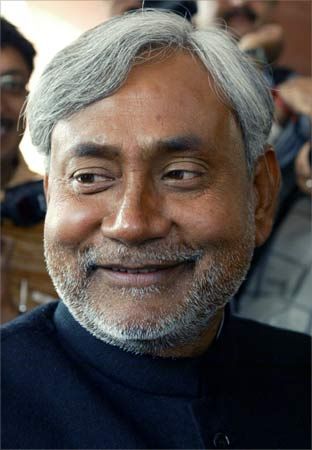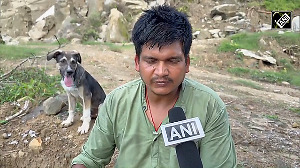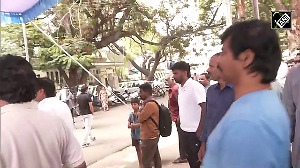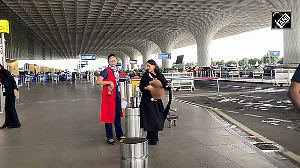 Nobody can possibly ignore the heating up of the political climate as the country heads towards the 16th Lok Sabha elections, says AK Bhattacharya
Nobody can possibly ignore the heating up of the political climate as the country heads towards the 16th Lok Sabha elections, says AK Bhattacharya
The questions is not whether the next general election is held in May 2014 or earlier. What is significant is that political parties have begun taking carefully calibrated positions keeping in mind the polls ahead
Make no mistake about it. India has gone into election mode. Leaders of the United Progressive Alliance, or UPA, may still argue that elections are at least about a year away. But political parties across the entire spectrum have begun preparing for the battle ahead -- the next general election.
Whether it is held on schedule in May 2014 or earlier, in the latter half of 2013, is not the question. What appears to be significant is that political parties have begun taking carefully calibrated positions keeping in mind the general election ahead.
Take, for instance, the proposition Bihar Chief Minister Nitish Kumar put forward at New Delhis Ramlila grounds last Sunday. The purpose of Kumars public meeting was not just to tell the assembled people about his demand that the Centre confer on Bihar the status of a special category state, which in turn would allow his state to gain increased access to central funds.
Indeed, the demand was not new; nor was the gathering at the meeting unaware of Kumars specific demand for special category status for Bihar. What made the meeting significant was the chief ministers clear indication that the support of his party, Janata Dal-United, to whichever national party that aspired to form the next government at the Centre would depend on its meeting Bihars demand to be treated as a special category state. This is nothing but political bargaining for the next general election.
On Tuesday, Muthuvel Karunanidhi, head of the Dravida Munnetra Kazhagam, issued a threat to the UPA that his party would withdraw its support to the UPA and ask its five ministers to resign from the Union council of ministers, if the Union government did not take a strong position against Sri Lanka for that countrys treatment of Tamils there. The UPA government was naturally shaken. Its vulnerability to pressure from its alliance partners and those supporting it from outside increased.
Questions began to surface over the governments stability and survival. The stock markets fell, even though leaders of both the Samajwadi Party and the Bahujan Samaj Party extended their support to the UPA in what turned out to be its hour of crisis. It is likely that the crisis would blow over with the Congress and DMK leaders entering into an understanding on this issue. But nobody can possibly ignore the heating up of the political climate as the country heads towards the 16th Lok Sabha elections.
The two incidents -- Kumars demand for special category state status and Karunanidhis demand for a parliamentary resolution on the plight of Sri Lankan Tamils -- are not entirely similar. Kumar was openly offering a pre-election deal, while Karunanidhi was putting pressure on his current alliance leader to accept his demand -- a move that many of his critics would describe as blackmail.
Yet, the similarities lie in the fact that both the regional parties are jockeying for an electoral platform that might win them votes for the next general election. This becomes even more significant because there is by now little doubt that in the coming general election no single political party would be able to win a clear majority on its own strength, even though that would be the goal of both the Congress and the Bharatiya Janata Party.
By announcing in New Delhi that he would support a government at the Centre that in effect grants more central resources to Bihar, Kumar is killing two birds with one stone. One, he is telling the electorate in Bihar to elect as many of his party members as possible for the 16th Lok Sabha, so that it increases his bargaining power with whichever party hopes to head the next alliance at the Centre. Two, Kumars open offer is also a signal to the BJP that his partys support is not unconditional.
Unless the BJP makes up its mind on Narendra Modi Mr Kumars satisfaction or endorses Bihars claim to make it a special category state, the Janata Dal-United could well look at new political formulations.
Similarly, for Karunanidhi, making such gestures to the Tamils is certain to help him in the next general election as well as strengthen his position vis-à-vis his partys negotiations with the Congress for the formation of the UPA after the results are in.
It is likely that more regional political parties will make such pitches in the coming months. The Trinamool Congress will be waiting for an opportunity to use the next available issue to make that a condition for its support to the next alliance government that is formed at the Centre. Nor will the SP and the BSP be left far behind in playing this game.
So the tasks for the UPA government in the coming months get even more difficult. It has a long list of economic policy actions that need to be implemented without further delay. Major economic Bills are to be passed by Parliament. Various investment hurdles have to be overcome through policy intervention and execution. But each of these moves could be a casualty if any one of these regional parties chooses to make that an election plank for offering its support at the next general election.
Given the recent trend in Indias politics, this is not unlikely. That is why what happened last Sunday and on Tuesday should worry the UPA government.
Image: Bihar Chief Minister Nitish Kumar's demand for special status for his state is political and election-oriented









